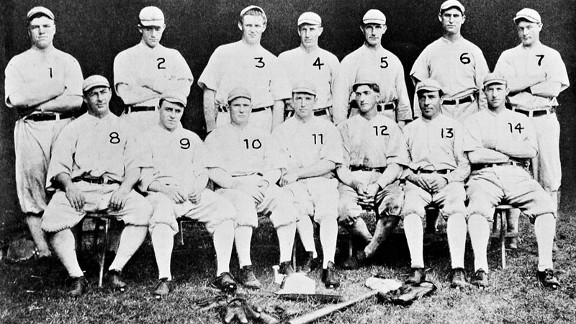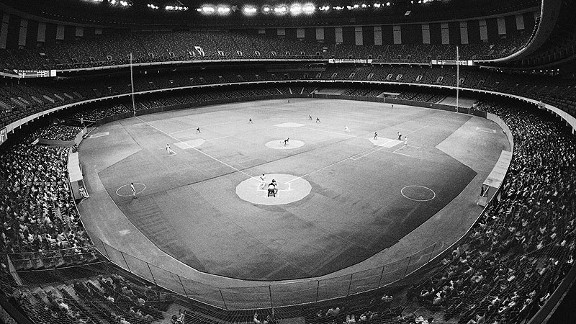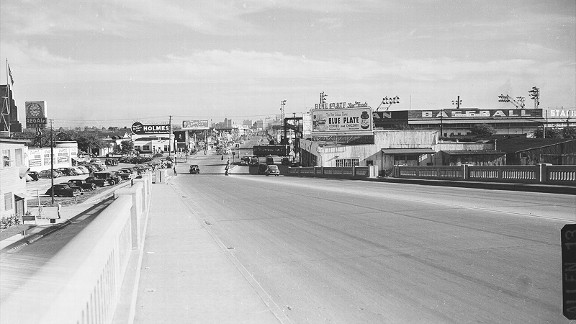If the reports are true, the NBA's New Orleans Hornets soon will be the New Orleans Pelicans, fulfilling new owner Tom Benson's wish of giving the team a name more connected to the city.
How connected is it? Other than the fact the animal is Louisiana's state bird and on its seal and flag, New Orleans' first professional sports franchise -- a minor league baseball one -- carried the name from the late 1880s into the 1950s, and the name was later resurrected for one year two decades later.
And those original Pelicans, of course, carry a history -- a history that, among many other things, involves one of baseball's most famous non-Hall of Famers, plus a single season in New Orleans' most iconic building.
Shoeless Joe was a Pelican
 Mark Rucker/Getty Images
Mark Rucker/Getty Images
Long before the Black Sox Scandal, "Shoeless" Joe Jackson -- No. 12 in this old photograph -- played his final minor league season for the team, then in the Southern Association. Jackson, 22 and 23 at the time, hit .354 in 136 games.
The story of Pelican Stadium
According to a report, legend has it that Pelican Stadium, originally called Heinemann Park, once saw Joe DiMaggio hit a ball so far that, after catching it, the outfielder needed a timeout. And so it went with New Orleans' first real stadium, which stood from 1915 to 1957 and held teams that were affiliated with the Cleveland Indians, St. Louis Cardinals, Boston Red Sox, Pittsburgh Pirates and New York Yankees. Now on the stadium's original spot? Among other things, a Burger King.
The Superdome year
 AP Photo
AP Photo
The Pelicans left NOLA after 1959, heading to Little Rock, Ark., before being disbanded two years later. Then, in 1977, owner A. Ray Smith moved the Triple-A Tulsa Oilers to the Big Easy and revived the name … for a team he'd put in the Superdome. They drew more than 217,000 fans -- a big number -- but high rent costs made the situation untenable (the team moved to Springfield, Ill., the following year). On the team: Future MLB managers Tony La Russa and Jim Riggleman.
How connected is it? Other than the fact the animal is Louisiana's state bird and on its seal and flag, New Orleans' first professional sports franchise -- a minor league baseball one -- carried the name from the late 1880s into the 1950s, and the name was later resurrected for one year two decades later.
And those original Pelicans, of course, carry a history -- a history that, among many other things, involves one of baseball's most famous non-Hall of Famers, plus a single season in New Orleans' most iconic building.
Shoeless Joe was a Pelican
 Mark Rucker/Getty Images
Mark Rucker/Getty ImagesLong before the Black Sox Scandal, "Shoeless" Joe Jackson -- No. 12 in this old photograph -- played his final minor league season for the team, then in the Southern Association. Jackson, 22 and 23 at the time, hit .354 in 136 games.
The story of Pelican Stadium
According to a report, legend has it that Pelican Stadium, originally called Heinemann Park, once saw Joe DiMaggio hit a ball so far that, after catching it, the outfielder needed a timeout. And so it went with New Orleans' first real stadium, which stood from 1915 to 1957 and held teams that were affiliated with the Cleveland Indians, St. Louis Cardinals, Boston Red Sox, Pittsburgh Pirates and New York Yankees. Now on the stadium's original spot? Among other things, a Burger King.
The Superdome year
 AP Photo
AP PhotoThe Pelicans left NOLA after 1959, heading to Little Rock, Ark., before being disbanded two years later. Then, in 1977, owner A. Ray Smith moved the Triple-A Tulsa Oilers to the Big Easy and revived the name … for a team he'd put in the Superdome. They drew more than 217,000 fans -- a big number -- but high rent costs made the situation untenable (the team moved to Springfield, Ill., the following year). On the team: Future MLB managers Tony La Russa and Jim Riggleman.

Δεν υπάρχουν σχόλια:
Δημοσίευση σχολίου